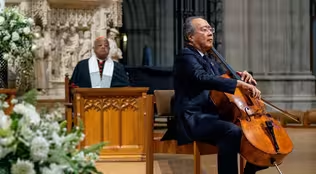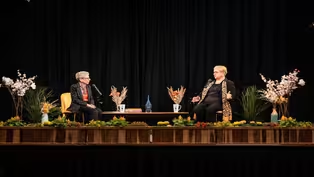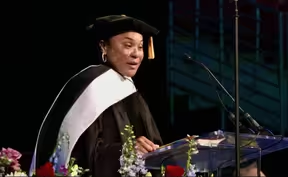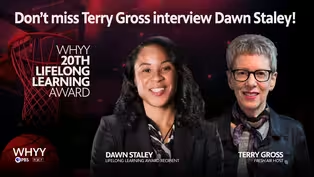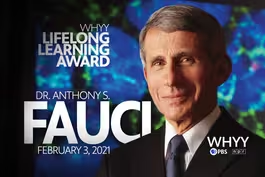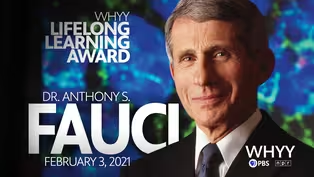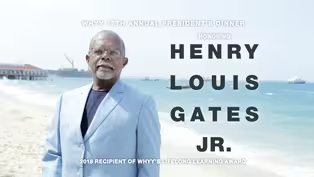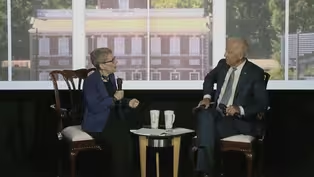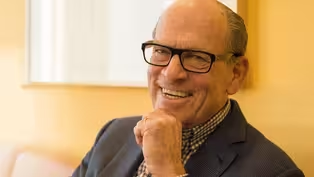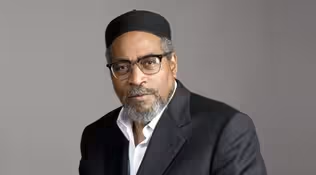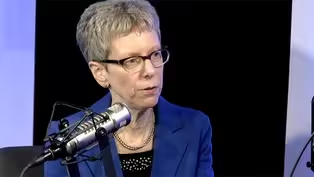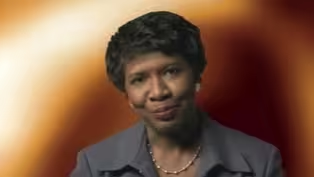
James Patterson in Conversation with Terry Gross
Special | 27m 19sVideo has Closed Captions
Renowned author James Patterson accepts WHYY's 23rd Lifelong Learning Award.
WHYY honors renowned author James Patterson with the 23rd Lifelong Learning Award. This special event features an interview between James Patterson and Terry Gross, host of Fresh Air.
Problems playing video? | Closed Captioning Feedback
Problems playing video? | Closed Captioning Feedback
WHYY Presents is a local public television program presented by WHYY

James Patterson in Conversation with Terry Gross
Special | 27m 19sVideo has Closed Captions
WHYY honors renowned author James Patterson with the 23rd Lifelong Learning Award. This special event features an interview between James Patterson and Terry Gross, host of Fresh Air.
Problems playing video? | Closed Captioning Feedback
How to Watch WHYY Presents
WHYY Presents is available to stream on pbs.org and the free PBS App, available on iPhone, Apple TV, Android TV, Android smartphones, Amazon Fire TV, Amazon Fire Tablet, Roku, Samsung Smart TV, and Vizio.
More from This Collection
The WHYY Lifelong Learning Award recognizes an honoree who has demonstrated a passion for lifelong learning for themselves and for all those they can inspire. Previous recipients include President Joseph R. Biden, Dr. Anthony Fauci, Dr. Henry Louis Gates Jr., Gwen Ifill, Coach Dawn Staley, Lidia Bastianich and more.
Yo-Yo Ma in Conversation with Terry Gross
Video has Closed Captions
Renowned cellist Yo-Yo Ma accepts WHYY's 22nd Lifelong Learning Award. (58m 45s)
Lidia Bastianich: WHYY Lifelong Learning Award 2023
Video has Closed Captions
Chef, television host, and restaurateur, Lidia Bastianich accepts WHYY's 21st LLA. (28m 45s)
Terry Gross in Conversation with Dawn Staley: Full Version
Honoring Olympic gold medalist, NCAA-winning coach & Basketball Hall of Famer Dawn Staley (1h 27m 4s)
Terry Gross in Conversation with Dawn Staley
Video has Closed Captions
WHYY 20th Lifelong Learning Award recipient Dawn Staley interviewed by Terry Gross (28m 45s)
WHYY’s Lifelong Learning Award honoring Dr. Anthony S. Fauci
Special virtual event honoring Dr. Fauci. (1h 6m 50s)
WHYY’s Lifelong Learning Award: Dr. Anthony S. Fauci VIP Q&A
Special virtual event honoring Dr. Fauci. (1h 35m 4s)
WHYY’s 17th Annual President’s Dinner
Video has Closed Captions
WHYY’s 17th Annual President’s Dinner featuring Dr. Henry Louis Gates Jr. (28m 47s)
Video has Closed Captions
The 2017 WHYY President's Dinner honoring Joseph R. Biden, Jr. (56m 46s)
WHYY's 15th Annual President's Dinner
Video has Closed Captions
WHYYs 15th Annual Presidents Dinner Honoring Joseph Neubauer (28m 47s)
WHYY's 2014 President's Dinner, Honoring Kenneth Gamble
Video has Closed Captions
Proceeds from this distinctive event support WHYY's extensive educational initiatives (27m 20s)
WHYY's 2013 President's Dinner, Honoring Terry Gross
Video has Closed Captions
WHYY turns the tables this year and honors Fresh Air host Terry Gross. (23m 13s)
WHYY's 2008 President's Dinner: Gwen Ifill
WHYY's 7th Annual Presidents Dinner Honoring Gwen Ifill (26m 42s)
Providing Support for PBS.org
Learn Moreabout PBS online sponsorship- [Announcer] Please welcome Terry Gross, the host of "Fresh Air with Terry Gross and Tonya Mosley", and tonight's honoree, James Patterson.
- Well, first of all, congratulations.
- [James] Thank you.
- And thank you for doing this interview.
- I am not worthy, I am not worthy.
(audience chuckling) - So people are always wondering, how do you do it?
How do you write so many books?
- [James] Yeah.
- And the answer is, you collaborate.
- Well, that's part of the answer.
- It's part of the answer, yeah.
- Part of it is you love to do it.
Somebody said, you're lucky if you find something you like to do, and then it's a miracle if somebody will pay you to do it.
But even before people were paying me to do it, I just loved it.
And actually I was working at McLean, the hospital, which is when I started writing.
I would go into Cambridge and buy.
I went to a Catholic high school and they just gave us a lot of books that none of us liked.
But when I moved up there, I started reading a lot of stuff, the kind of stuff I hadn't read before.
And I was loving a lot of plays, short stories, and a lot of novels.
And then I started scribbling and I loved it.
I just loved telling stories.
And I think, I grew up in the woods, and I used to, as a little kid, I would go out in the woods and tell myself stories, and story after story after story after story.
And I think that, and I remember actually when I used to get down to Vanderbilt, I would drive down there from Massachusetts, it would take like 26 hours or whatever.
And I used to write Broadway musicals in my head, driving down to, and sing the songs.
It was crazy, but you know.
- The music?
- You might notice a pattern here.
- The music and lyrics?
- Well, yeah, I mean, sort of the music, yes.
Yeah, yeah.
I would always put a tune to it, whatever I was, you know.
And the storyline, whatever the heck it was.
And I would just, I dunno, but it was fun.
I liked it.
It was, you know.
- Did advertising, you were the head of J. Walter.
- Oh, I don't get into that.
- No, I'm gonna ask you a question.
- I was in advertising, but I've been clean for over 30 years now.
- [Terry] Yeah.
(audience laughing) But there.
- I can't believe she brought that up.
- Of course, I'm gonna bring it up.
But did you write jingles?
Because that's.
- [James] I wrote.
- It's not a Broadway musical, but it's still.
- The one people know the best is Toys R Us Kid.
I don't wanna grow up.
- [Terry] You wrote the, I don't wanna grow up?
- I did not write the lyrics, I wrote the idea.
My friend Linda Kaplan.
- Yeah.
- Wonderful, wonderful, wonderful.
She wrote the little tune.
- Oh, okay.
- And most of the lyrics.
I wrote, I don't want to grow up, I'm a Toys R Us kid, which was about adults kind of not.
And adults kind of like to go to toy stores and look around.
It reminds them of when they were little and stuff like that, yeah.
- Yeah, okay.
So getting back to collaborating.
- Yeah.
- At what point in your writing career did you think that it would be helpful or a good idea or more productive or whatever to work with collaborators?
And then maybe you can explain your process for doing that.
- Yeah, people, I don't know why people find it so extraordinary.
First of all, in advertising, which I hate to go back to that prison, but in my mind, it's very collaborative.
And you generally, you work with an art director and maybe a producer, and the two or three of you will sit in a room and you create these little stories, little films usually.
And that is collaborative.
Sistine Chapel, all these, some famous, doing this thing on the, five, 10, whatever number, collaborative.
My own theory is if we're gonna save the world, we'll have to somehow figure out how to be collaborative or AI will probably figure it out for us.
And either save us or destroy us, depending on the mood that day.
But it just seemed a natural thing to me.
And the first one actually was a little golf book, and it's a guy that I knew from the advertising days.
And after we played golf, we just started chatting about a story that I had.
And we said, well, let's just try this.
And we wrote "Miracle on the 17th Green".
And then after that, I just said, you know what?
I can do this, this will be an interesting thing.
And I don't remember the first one.
It might've been "A Women's Murder Club" where I collaborated the second or the third book.
Andy Gross, wonderful guy who just died, it was so tragic.
- Yeah, I read the obit.
- Oh my God.
And he's such a healthy looking man and a wonderful person.
At any rate, that was very sad for us.
And obviously it's tragic for his family.
- You describe yourself as being the storyteller, but you enjoy telling the stories, writing, coming up with a story.
- [James] Yeah.
- Doing a very elaborate 30, 50, or 60 page.
- 30, 40, 50 page, yeah.
Outlines, yeah.
- Outline, and then.
- No, I mean.
- Doing several drafts.
- On this tour, I'm working on three outlines.
- Yeah.
- Boom.
- But then you leave this actual sentences in the book.
- Wait 'til you see what happens to Alex Cross, I gotta tell you.
(both chuckling) - But you leave the sentences in the book to the person you're collaborating with.
At what point did you think that you'd stick to the story and leave the sentences to someone else?
And correct me if I'm getting that wrong.
- Well, no, no, yeah, no, I didn't.
I mean, a lot of times, especially in the beginning.
- Am I compartmentalizing too much?
- No, I would go in and do two or three drafts in the beginning.
- Yeah.
- Not as much now, because most of the people I'm working with, they kind of know the joke.
But I'll still come in and rewrite.
I mean, the most insane thing was when I did the Bookshots, which were novellas, which I still think was a very valuable thing to do.
So the stores would have these, you could read these books in a couple of hours, like a movie.
They were novellas, 100 pages, 100, whatever the heck.
And I think it's a useful thing.
The publishers were afraid of it because, oh my God, people are gonna buy these $7 books and they won't buy, well, they will buy longer books, but you're just gonna have more people.
And some of them, that's all they have time for.
They have a couple hours and they want to, it's like a movie.
But the year I did that, I wrote 2,400 pages of outlines in addition to two full books.
And then that's one of the things that people are looking at what I do.
And they go, well, and they always project their own situation.
And people are sort of funny that way.
Like with the Dad book, how to be a better dad in one hour, I'll talk to these various people who interview you, and they go, what's the one idea?
And I go, there isn't one idea.
The whole idea of this book, there's so many things dads can work on.
And they just need to figure out the things that pertain to them.
And the reason it's one hour is because most dads will not read the 400 page book.
So what I did is just try, and that's not a joke, but it's serious.
I mean, 'cause I wanted to be pragmatic about it.
And what I've heard, and I've never had this experience before, but especially women who read the book and they say, I'm giving this quite seriously to my husband, quite seriously to my dad, and quite seriously to my two goofy brothers who are dads and really need help.
And guys do, guys need help right now.
Not every dad, obviously, but a lot of them, they're lost, they're overwhelmed.
A lot of them, they're not the breadwinner.
And now, who am I?
Where do I fit in?
How do I?
And in terms of being dads, they won't talk to one another about it.
They'll go out and they'll talk about sports and trucks and whatever, and not everyone, but mostly they won't talk about, well, my kids and I can't relate them.
One of the big things, actually, I mean, if you had a, it's not one thing, but being there, being present is one of the big things for dads.
Listening, huge, listening.
Telling your story to your kids.
Meaning, who are you, what do you stand for?
What are your values?
Being able to say that to your kids and then listening to their stories, listening to their stories, and not be too judgy about them.
- Are these things?
- There's so many things that.
- Are these things that your father did or did not do for you?
- My dad, the only time.
And this isn't totally true, but my only hug I ever got from my dad was on his deathbed.
And he apologized and he cried, which he never did.
- Well, he apologized for not hugging you or for something else?
- He apologized for just not being as close as he thought he should have been.
And I just thought, I said, you were a great dad.
You're a great dad.
- Was he?
- He was, look.
He grew up in the Newburgh Poorhouse.
It was called the Pogey.
His mother was a charwoman there.
His father had disappeared, he never knew his father.
And so he didn't have the experience to be a dad.
And that's fine.
And I did therapy for one year and I got in touch with, and I just don't blame him.
It was fine, he did the best he could.
I have a friend, his whole thing is doing the best you can religion.
You're doing the best you can.
Okay, that's good.
God bless you.
You're doing the best you can, okay.
- What did your father end up doing to make a living?
- Well, the last thing he did after he retired, he retired at 60, 61.
He actually wrote a novel.
It didn't get published, but it was pretty good.
It was pretty good.
And that's what he wanted do.
He went to Hamilton, which is to go from where he was, the poor house, and to get into Hamilton, leap.
Unbelievable leap.
- [Terry] Sure.
- He was a bright guy.
He didn't have a lot of confidence.
He just didn't think he could.
He sold insurance.
And then he actually did well, he worked for Prudential, he did well in the insurance stuff, but he didn't have the confidence.
And he didn't instill confidence in myself and my sisters either, which was unfortunate.
But my grandmother, she was the one, she said, listen, you're gonna be real about this stuff.
You're not gonna play in the NBA, so forget about that.
You don't go to your left very well.
You're good, I could dunk in high school.
I was a little white guy that could dunk, but you're not gonna make it.
But you are gonna be able to do stuff.
And she had one of the lines, which I use it on Substack, is hungry dogs run faster.
That was one of her things.
And the other thing was just go out and chop wood.
Do it, do it.
Stop talking about writing your book.
Go write the damn book.
Seriously.
I'm doing a thing now, which is kind of interesting.
And we're working on, and we have a list already now, and it's just go finish your book and I'm gonna give people money to go finish their books.
- I hope they're good.
- And they're sending.
Yeah, yeah, yeah, yeah, yeah, yeah.
We do try to do a lot of that stuff.
The thing that Sue and I never do is we don't put our names on buildings and stuff like that, but we do a lot of the scholarships.
One of the great ones, which I love, is a few years ago, I got involved with just a couple of historically Black universities and colleges.
And the more I found out about them, they don't have money.
They don't have these big sums of money.
They can't give out many scholarships.
So the kids there desperately need scholarships.
So we have, I think 37 historically Black universities that were giving scholarships out.
It ranges from 10 to 20 for each one, 10 to 20 schools.
And historically Black universities and colleges, 60% of the doctors, Black doctors in this country start at historically, which says great things about these schools and terrible things about the rest of the schools in this country.
The rest of these schools are, they're 40% of the Black doctors, that's all that are coming out of these schools that claim to be so diverse.
Well, what's happening, folks?
It's not, it's just terrible.
It's unfortunate.
But these schools are great.
And I always encourage people when they're thinking about what to do with their money, just think about that.
Consider that as one, and also give money to the right here because, no, no, no.
It's so right and so important and useful.
And I'm so, as I said initially that I am not worthy, I'm not worthy.
I am not worthy but you all are.
And what you do is just stunning.
And it is important and so useful, especially right now.
- So your grandmother encouraged you to write.
- Thank you for remembering where you're, as I babble.
(audience laughing) - Your mother was a teacher in a Catholic school.
- Yeah, she got paid in.
- She bought.
- They didn't even pay them in bills.
It was just change, they would give them change.
- It sounds like it was close to that, but also she bought books for her class out of her own money.
- Yeah, sure.
Oh, they did, yeah, yeah.
- Yeah.
- Well, and teachers still do.
Teachers still do, absolutely.
- And you try to help out with that.
- No, and I have a book coming out.
- So.
- I do this series of nonfiction.
There's one coming out about teachers now.
Teachers, this is another group.
This group needs to be supported and helped.
And they are spending their own money.
They are spending their own money.
- Getting back to you.
Your grandmother encouraged you to write, your mother was a teacher in a Catholic school.
You, however, really hated reading until.
- I didn't hate it, I just was bored by it.
- So what got you kind of more interested in reading, according to your memoir, is when you were working as a psychiatric aide.
- Yeah.
- At the hospital, the mental health hospital affiliated with Harvard Medical School.
- Harvard Medical School, yeah.
- Yeah, and when the patients were sleeping, you'd read, and you read things you really loved.
- [James] Yes.
- You chose them yourself.
- Yeah.
And it was all serious stuff.
It wasn't the kind of crap that I write.
(both laughing) No, no, but it totally turned me on.
- Yeah.
- Totally, totally.
And as I said, then I started scribbling and I loved it.
I just loved telling stories and writing the stories.
- But did being in the hospital watching psychiatrists?
- [James] Yeah.
- Interacting with people who had mental health.
- [James] Yeah.
- Issues.
Inform your books in any way?
In terms of character development or?
- No, I think all it did was open my brain up to the different ways people are, the different.
And it wasn't, I mean, it was a combination.
A lot of the younger, there were a lot of younger kids in there, and it was just adolescent turmoil and/or family problems and stuff.
I don't know if they should have necessarily been in a mental hospital, but they were.
And then you had, people had gotten lobotomies.
There was one ward there, and it was just, so it was a real mix.
There were two violent, it was one violent for women and one violent for men.
It wasn't like people trying to, I wasn't afraid to be there.
And actually I had friends in the violent male and they were okay.
They were my buddies.
And after I moved to New York, they'd call me in New York, say, yeah, I'm out now.
I'm okay.
I got a kid and blah, blah, blah, blah.
It's humanity.
It's not like, "One Flew Over the Cuckoo's Nest".
I don't know what the hell.
I mean, it's a wonderful book and wonderful movie, but that's not a mental hospital.
That's a play, that's an opera.
- So I wanna ask you about your Alex Cross series, which is like your longest running series of books.
- [James] Yeah, yeah, yeah.
- It was one of your first, it was like, "Along Came a Spider" was a real breakthrough novel for you.
It's been made into three films.
- Yeah.
- Like two with Morgan Freeman and one with Tyler Perry.
And it's an Amazon Prime series.
- Yeah.
- It's gotten renewed for a second season.
You've got a new one coming out this summer?
- New Alex Cross coming out in the fall.
- In the fall, okay.
- It's a "Return of the Spider", so that's an interesting.
- So you're going back.
- A little bit, yeah, yeah, yeah.
- To the first one.
- Yeah.
- Oh, okay.
But Alex Cross the homicide detective.
- Yeah.
- In your book, started off as Alexis Cross, started off as a female detective.
- [James] Yeah.
- And also Alex Cross and Alexis Cross are both Black characters.
- Yeah.
- So why was the original character a Black woman?
- I don't know.
Growing up, my grandparents had a small restaurant, very small restaurant in Newburgh, New York.
And the cook was a Black woman.
And at a certain point when I was a little kid, she was having problems with her husband and just the way my family was, come live with us.
So she lived with us for three or four years, whatever, a while.
And she didn't have household duties.
She just was the cook in the restaurant.
And I spent a lot of time with her family, and I loved them.
They were great.
Her kids, her grandparents, whatever.
And they were funny and smart.
And so I just got a feeling for the families.
And that part of Newburgh, which was a town that had a fairly large Black population.
I played a lot of basketball, as I mentioned, and that was the best in terms of playing basketball.
And that all just stuck with me.
And I would watch a lot of Hollywood stuff and I'd go, pretty much in those days, Hollywood did, they always think they're so hotsy totsy.
But in those days, almost every Black boy, other than Sidney Poitier, would have a boombox on their shoulder.
And I went, this is crap, this is just.
And it's one after the other after the other.
And I just said, I just wanna write something that feels a little closer to what I've experienced, and it's gonna be a thriller.
So we're not gonna get deep into, and this notion of family.
And then the thing which is really at the core of a lot of my books, "Women's Murder Club", "Michael Bennett", which is what we all deal with.
It's balancing work and home life.
That's what Alex is.
That's the real, that's what I love about the series on Amazon, because Aldis, who plays Alex, he is intense as a detective.
So it really works as a detective.
And then he's great with the kids.
So you really get Alex, or the Alex that's in the books, in that.
You didn't get it as much in the movies because they didn't do much with the family side of it, with Morgan being older.
And it's a two hour movie, so they only had so much time.
But I love what they did, and it's more realistic.
It's closer to what cops really have to deal with in Washington these days.
So I'm really, really happy with the way that turned out.
They actually, they've shot the second season already.
- So what wasn't working about the female version that made you change it to a male?
- I don't know, the voice?
The voice just, it wasn't working.
I just went, I've bitten off more than I can chew here.
And I just said, no, let me, I'm gonna change this to a male and let's see what happens.
- If you were writing the first Alex Cross novel today, do you think it would be considered less acceptable because your white?
- I don't care.
I just don't care, people can make their.
We talked about, you weren't familiar with Mel Robbins, but she has that book, "Let Them".
And let them, let them have the way they think.
That's okay, they're allowed to think the way they think.
And that's the way I feel about that.
Let them, they're absolutely allowed to have that point of view.
- Did you know that you'd be capable of writing mysteries and thrillers?
- No, and somewhere in there, I think it was when I was in Vanderbilt, I read, and I didn't read a lot of commercial novels at that point, but I read "Day of the Jackal" and "The Exorcist", and I went, oh, these are cool.
I like these, and maybe I could write something like that.
The novel that had knocked me out, "100 Years of Solitude", and I said, I'm not capable of that.
I thought I could write a literary, an okay, but I said, I don't really wanna do that.
I don't wanna write for those people.
Honestly, I'm not interested in those kinds of stories.
But I said, no, maybe I could do something like "Day of the Jackal", maybe, but I can't do "100 Years of Solitude".
I don't have it in me.
And that's what I'd like to do.
But it's like, you know you're not gonna play in the NBA.
(Terry laughing) Sorry.
(James chuckling) - Yeah, so.
- I didn't have the confidence, and that's a big deal.
And fortunately down there, there was a professor and I took one writing course and he said, you have it, you have that.
And he was a real conservative southern guy, and I was the hippie with the long hair and the whole whatever.
I wish I had the long hair now, but, you know.
(both chuckling) And that was a big confidence builder.
That was huge for me, huge.
- So in "Along Came a Spider", your first Alex Cross novel.
- [James] Yeah.
- The children are victims in it.
And I was wondering if that was considered taboo at the time?
- I don't know.
I don't know taboo.
Taboo doesn't work for me.
- Right.
- But it's a least of our problems, honestly.
- [Terry] Oh.
- That's not, we have some real things to worry about.
It's an interesting thing, and it relates a a little bit to "Let Them".
With President Clinton and I, we have a thing now, we talk about it a lot, about trying not to ruin a day or an hour worrying about things you can't do anything about.
If you can do something about it, do it.
I do things, I do things.
So Dad book is a very serious book.
People think it's, a lot of people say, it's the most important book I wrote.
It doesn't matter whether people read Alex Cross books, that Dad book will turn around lives.
It really will, and that's why I bothered to write it and labor to make sure it was in a voice that guys would be okay with it, that they wouldn't feel they're being lectured to.
And no guy can read that book and not become a better dad.
Not a perfect dad, a better dad.
And if one hour you can become a better dad, that is some good stuff.
That's important, that's useful.
- So you mentioned Bill Clinton and you wrote a best seller with him.
- [James] And we have another one coming out.
- And you have another one coming out.
- [James] A week or so, yeah.
- Yeah, yeah.
So when you are collaborating with somebody like Clinton.
- Yeah.
- How does that process work?
How does it compare?
- All the collaborations are different.
I just finished one with Viola Davis and Viola, it's a novel and I love it.
I love the novel.
So that was different, say.
With President Clinton, he's a good writer.
He reads a lot of mysteries, reads a lot of everything.
He just reads and reads and reads.
And he writes some of it himself, which is great, and he brings authenticity.
Even if you're a pretty good researcher, you don't really know, but with President Clinton, he could say, no, this is what the Secret Service would actually do.
Or this is what you would really feel like in this situation.
Or this, that would never happen in a million years.
- There was a big article in "The New York Times" recently that you're now collaborating with person known as MrBeast, who is one of the biggest influencers.
- Yeah.
- Really famous from his YouTube stuff.
- [James] Yep, yep, yeah.
- Started being famous with these competitions.
Like, I survived the five most dangerous places on Earth.
And the new book sounds like it's a competition.
You explain.
- It's gonna be a competition, yeah.
What I, actually, sometimes a good deed does go unpunished.
There was an agent and he brought me the Einstein estate, and they wanted to do kids books that would get kids interested in Albert Einstein and his theories.
- Oh, that's where "Max Einstein" book comes from.
- Yeah, but they said it has to be entertaining.
I said, oh, all I have to do is write a book for little kids about Einstein's theories and make it entertaining for small children.
Got it, okay.
(Terry laughing) No, but it was a great challenge and I loved it.
And I really liked the books.
Then he brought Lonnie Ali, who went to Vanderbilt, Muhammad Ali's widow.
She wanted to do something that would change the way people looked at him as a kid.
They just thought he was just a bad student.
He really had a learning disability.
He was always charismatic.
So write something about his days in Louisville.
And I got together with Kwame Alexander, who's a friend.
And so we did this thing, and it's a really interesting book because half of it is prose and half of it is poetry.
So it's, and it goes back and forth.
- Well, he's a great poet.
- Oh, he is, he is.
And the thing about him is you never wanna follow him in a speaking engagement.
No, don't follow Kwame.
Go first.
(both chuckling) - So getting back to MrBeast and to collaboration.
- Yeah, yeah, yeah, sure.
- It's like a demographic match made in heaven.
You've got the whole world covered.
- I don't, yeah, yeah, yeah.
- But I am not saying that's why you're doing it.
- Yeah.
- But do you feel like it's a match of sensibilities?
- Here's the, I, anyway, the agent who brought me those, he had MrBeast, and he said, would you be interested?
I don't know, let me, so I went up to North Carolina, Sue and I went to North Carolina, and we spent four or five hours.
He's a fascinating guy.
- Did you know who he was?
- Yeah, I knew who he was a little bit.
I know a lot more now.
And he's just stunning.
And since he was 13 or 14, he just loved doing these little videos.
He loves telling these stories and video stories, and they were kind of off the wall, but fun and interesting.
And he loves to give away money.
And so we had that in common that we like to do good stuff, and we like to tell stories.
And then we decided, well, we're gonna do a book and it's gonna sell like 20 million copies.
Do some, it will, it's crazy.
He is five times bigger than Taylor Swift.
- Wow.
- [James] Yeah.
- Really?
- Oh yeah.
No, he's got like 900 million people that follow him.
It's amazing.
And it's interesting because under 36, he's The Beatles, everybody knows him.
Over 36, most people don't even know who he is, even though he is been on the cover of "Fortune" and blah, blah, blah, blah.
- Yeah, I only found out about him like a year ago.
- We'll see what happens.
I'd love to, once again, the whole spirit of this thing is just keep growing.
And that's what I love about that.
I wouldn't have imagined doing it in a million years, but I'm really excited about doing it and doing it well, as well as I can do it.
- So I'm.
- That's the other thing for me in terms of what drives me, honestly, is at the end of it, and it doesn't always work out.
The end of it, I go, I'm really glad I did that project.
There's a line and it's not mine.
You may know where it comes from.
And I think it's more useful for people who are listening or whatever, if they're 20 or 25 or 30.
And the language is, my time here is short.
What can I do most beautifully?
And I love that.
I didn't say it, somebody else did.
But I love it.
And it's motivated me for the last couple of years in terms of focus and deciding what projects you're gonna do or what projects you aren't gonna do.
Like the Dad book.
I just, I said I gotta do that.
I have to do it, I have to spend the time and do it somehow.
- James Patterson, I wanna thank you so much.
- No, this is great.
I'm so sorry for being an idiot, but, you know.
(audience laughing) - I don't think you'd be capable of being an idiot.
(Terry chuckling) - Yeah.
- Thank you for this, and congratulations on the Lifelong Learning Award.
- Thank you, thank you, thank you.
(audience applauding) (upbeat music)
Support for PBS provided by:
WHYY Presents is a local public television program presented by WHYY
